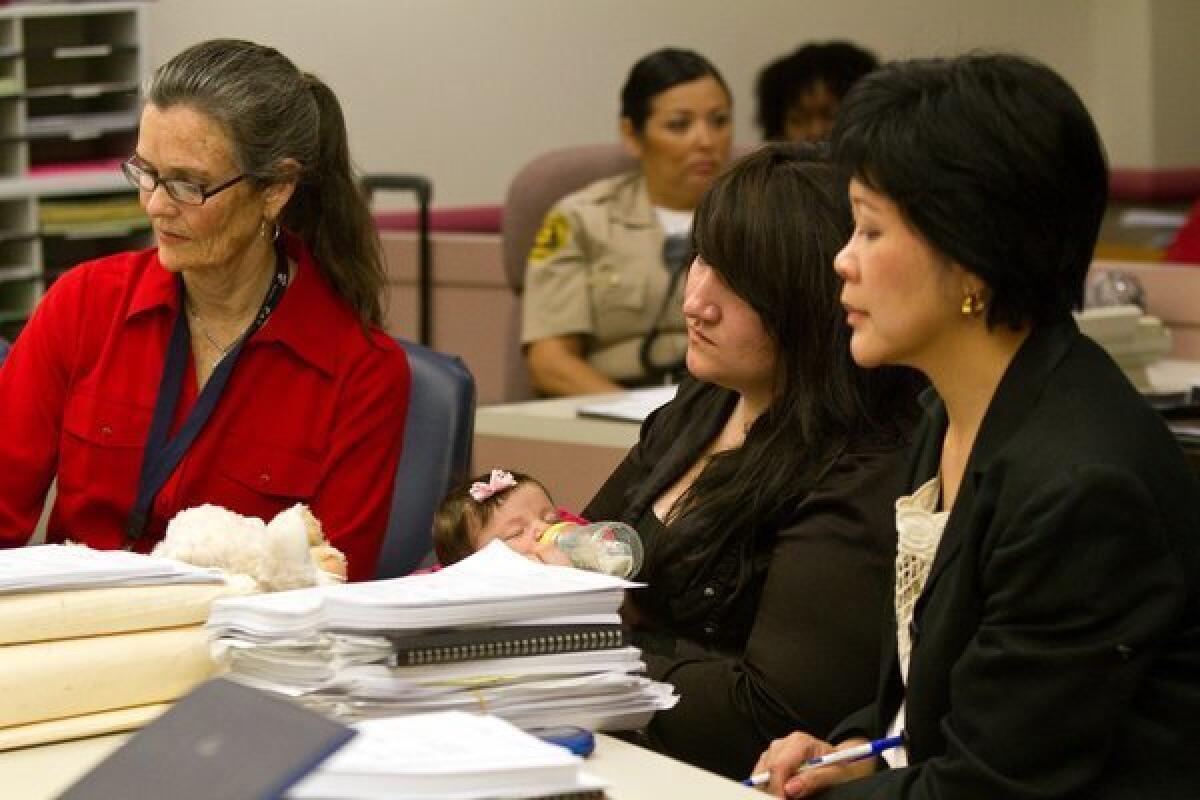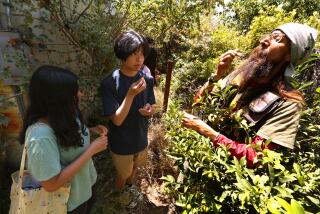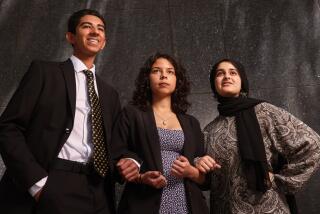Champions for foster children make a difference

Former high school principal Elois McGehee remembers what got her started. It was a graduation day at Locke High in Watts more than a decade ago.
“The graduation ceremony was over. I’m leaving school in my car, driving home,” she recalled. “Then I see this kid sitting at a bus stop — wearing a cap and gown.
“I thought, ‘What kid graduates from high school and doesn’t have a single person who comes to the school to celebrate with him?’ ”
Lots of kids, it turns out.
The boy was one of hundreds of Locke High students in foster care — living not with parents or relatives, but in group homes staffed by employees or with families paid to provide for them.
“I thought, ‘This is just not fair,’ ” McGehee said. “They’re alone through no fault of their own. They need somebody to advocate for them.”
Ten years later, after she retired, McGehee became that somebody — a court appointed special advocate (CASA), one of 375 volunteers charged with keeping vulnerable children from falling through gaping holes in the foster care system in Los Angeles County.
“You represent your child in every way, shape, fashion and form,” said McGehee — from arranging medical care for a fragile toddler to finding an algebra tutor for a failing student.
The CASA program has been around for more than 30 years, relying on public funding and private grants to recruit, train and supervise volunteers. But state budget cuts have been shrinking its funding and eliminated the money this year.
Now, said executive director Dilys Tosteson Garcia, “We have to raise every single dollar we need from private sources.”
They managed to raise enough this year to help a record number of children. But Garcia realizes that future fundraising depends on broadening the organization’s base of support.
CASA has relied heavily on white, middle-class women as volunteers. But 40% of children in foster care in Los Angeles County are black. So this month, the group held its first recruitment event at Dorsey High in the Crenshaw district, where thousands of black and Latino students live in group homes or with foster families.
“Do it for yourself, or tell somebody about us,” Garcia urged the two dozen people who turned out. “Let them know, ‘These are our children. This is our responsibility.’”
::
Samuel Herod shouldered that responsibility 10 years ago. Herod, 58, grew up in South Los Angeles and still lives there. “I see foster homes on every block in my neighborhood” near 39th and Western, he said.
He said he became an advocate because he “was tired of watching [foster children] leave the system not ready for work, not ready for school, with no one teaching them the things that our parents taught me and you.”
His first case involved two brothers, 6 and 7, who’d been parceled out to separate homes. He got them reunited. Then he got them adopted by two sisters who each were willing to adopt one boy, “so they’d grow up together,” Herod said.
Now he’s guiding six young people, from 17 to 21. Some problems are large, as children try to shake off family legacies of addiction and violence. Others are heartbreakingly small.
“I have a girl whose school pictures cost $39, and nobody would pay for them,” Herod said. “The group home says, ‘It’s not our responsibility.’ The county says, ‘It’s not our responsibility.’ ”
So Herod bought the photos. “Thirty-nine dollars they were arguing over, and they’re getting [thousands of dollars] to care for her.... What does that say to a child?”
Herod said being an advocate puts life in perspective: “You can complain, ‘I grew up in a single-parent home.’ Well, how’d you like to grow up with no parents, in 22 different foster homes?”
::
It’s not an easy task. Child advocates have to be patient listeners and indefatigable supporters; willing to challenge foster parents, social workers and school officials, and able to find sometimes 15 hours a month to consult with teachers, doctors and lawyers.
McGehee, the retired principal, signed on after she read a column I wrote about foster care two years ago. But volunteering is not the only way to help. You can write a check, or spread the word in your neighborhood, your church, your book club.
“We need to shine a light on foster children,” McGehee said.
At her schools, “you never saw the foster parents on Back to School Night or at parent-teacher conferences.... When you get a chance to work with these kids, you realize how alone they are.”
McGehee remembers calling the foster home of a student who had been late for school every morning. “I asked the foster parent for help: ‘Maybe wake her up earlier or something.’ ” A few days later, the student came into the office and asked for her transfer papers.
She was being moved to another home because the foster mother was annoyed by the principal’s call.
“I felt terrible about it,” McGehee said. “This child was totally on her own in the education process.”
Her observation made me think of all the phone calls and emails I get when I write about failing schools. “It’s the parents’ fault,” readers tell me.
But in some schools in Los Angeles, one in four students is in foster care — living in homes where no one seems to care if they make it to school on time, pass their algebra exam, get graduation photos. And only a relative handful — 600 of 26,000 foster children — have CASA volunteers looking out for them.
McGehee’s new charge is a 13-year-old boy, whose teachers tell her he is struggling. “He doesn’t call me,” McGehee admits. But she’s “monitoring” his algebra grades. “I reach out to him constantly.”
He may not appreciate it yet, she said. “But he knows there’s an extra person who cares.”
And that’s an important message to give a struggling, rootless child.
More to Read
Sign up for Essential California
The most important California stories and recommendations in your inbox every morning.
You may occasionally receive promotional content from the Los Angeles Times.










